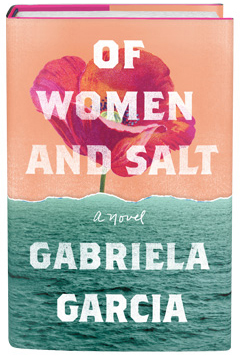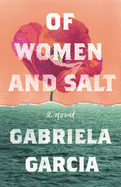Of Women and Salt
by Gabriela Garcia
Strong women and the nuanced complexities of mother-daughter relationships that reverberate through each generation are at the heart of Gabriela Garcia's debut. Of Women and Salt spans 19th- and 20th-century Cuba into present-day Miami, Texas and Mexico, and captures five women's often fraught emotional connections to each other, their deepest secrets and their unresolved traumas as it shifts in time and perspective.
Cuba, 1866. María Isabel is the only female employee at a cigar workshop in Camagüey, in a town with a mix of peasants, slaves, farmers and wealthy landowners. To break up the daily tedium of rolling cigars, a lector, Antonio, reads to the employees from classic novels, including Victor Hugo's newest work, Les Misérables. One day, a letter arrives from Hugo himself, pledging to "speak up for Cuba as I spoke up for Crete" and giving hope to the workers as conditions in Cuba begin to reflect the country's conflicts, precarious economy and impending war. Hugo encourages the workers by writing, "Who are we? Weakness? No, we are force."
With Antonio's help, María Isabel begins to understand the power of words and stories, and how books can provide comfort and strength during times of struggle. She accepts Antonio's offer to teach her to read and write her name, along with his gift of a treasured book (Cecilia Valdés) and his marriage proposal. On the day that their daughter Cecilia is born, María Isabel discovers the tragic meaning of "we are force" for herself as she learns to embrace a fortitude of spirit that she will unknowingly bestow upon the women of her family for more than a hundred years.
Miami, 2014. Jeanette, the great-great-granddaughter of María Isabel, has been battling a longtime addiction to drugs. Now in recovery for the third time, she struggles with the emotional pain that prevents her from breaking free of the destructive influences of her past mistakes, sexual assault, domestic abuse by her boyfriend, and her mother Carmen's stoic, perfectionist and controlling nature, which hides her love for Jeanette.
When Jeanette witnesses her El Salvadoran neighbor Gloria being taken from her home as part of increased enforcement by Immigration and Customs Enforcement (ICE), she becomes concerned for Gloria's young daughter, Ana, who is left behind--and is somewhat surprised by her own sudden maternal instinct to care for and protect the child. She takes Ana in for several days despite Carmen's insistence that the girl isn't Jeanette's responsibility, that she shouldn't get involved. Reluctantly, Jeanette acquiesces; a call to the police results in Ana also being taken away, her destination and fate unknown yet presumed.
Gloria and Ana's disappearance awakens Jeanette's desire to visit Camagüey, where her 80-year-old grandmother (whom she has never met) still lives. She hopes to understand why Carmen left Cuba decades earlier: "Cuba this, Cuba that. Cuba Cuba Cuba. Why anyone left a place only to reminisce, to carry its streets into every conversation, to see every moment through the eyes of lost home, was beyond her. Miami existed as such a hollow receptacle of memory, a shadow city of people who needed to put their past into perspective."
Jeanette tells Carmen, "I want to know who I am so I need to know who you've been," not fully accepting that "politics" is the real reason behind the grandmother's and daughter's decades-long silence--"I don't understand how abstractions like politics divide."
Politics is, of course, an undercurrent throughout Of Women and Salt. Garcia infuses her plot with Cuba's complicated and tumultuous history. She forces readers to examine "if loss unspoken becomes an inherited trait" and to question the multitude of ways that outside influences--governmental upheaval, drugs and abuse, duplicitous people, the specter of war--shape our understanding of ourselves, create shared mythologies and revise family legacies.
Garcia, the daughter of Cuban and Mexican immigrants, portrays each of her characters' interconnected stories with a deeply personal understanding of how the immigration experience is an individual one that shapes one's self-identity and sense of survival--if not for oneself, for one's children. Carmen demonstrates this in response to Jeanette's addiction. "But no mother on the outside could possibly know what it was like to face a truth like the one she'd been presented with: that it was her own love killing her daughter, that she needed to become stone, marble, not a mother at all, to save her daughter." When Gloria is transported without Ana to the Texas Regional Residential Center, she questions whether she even should be a mother; later, upon release, she and others are rounded up in a van and simply left in Mexico. Their only choices are to make another (potentially fatal) attempt to cross the border, return to their home country or stay in Mexico. The ramifications will last for many lifetimes.
Of Women and Salt marks the debut of a powerful literary voice, one that authentically amplifies and honors the stories and struggles of immigrants throughout generations. --Melissa Firman








